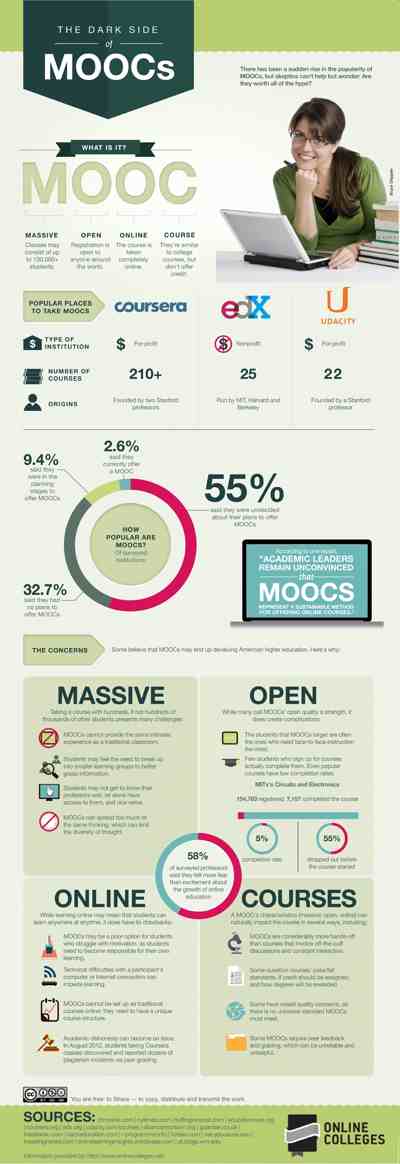| MOOCs - A Critique |
| Written by Alex Armstrong |
| Sunday, 24 February 2013 |
|
Massive Online Open Courses - are they a good thing or are they potentially harmful? It depends on which side of the fence you are standing. This infographic, which includes I Programmer as one of its sources along with the New York Times, the Guardian, Hack Education and the Huffington Post, aggregates some facts and figures and reviews some of the viewpoints expressed, which are both positive and negative.
Click for larger imag. Source: OnlineColleges.net
The infographic which has been compiled by an organization that provides information about online university education tends to look at MOOCs from the point of view of academia. Its answers to the question, How Popular are MOOCs to presents information on the proportion of the institutions surveyed that were already on or were planning to be on the MOOC bandwagon and it was only 12% while 33% had no plans and the remainder (55%) being undecided. The majority of professors surveyed said they "felt more fear than excitement about the growth of education" and some felt that MOOCs may end up devaluing American higher education.
Now let's look at MOOCs from the point of view of the student. One important point to make, and this is something that Sebastian Thrun of Udacity, Andrew Ng and Daphne Koller of Coursera and Anant Argwal of edX have all highlighted over the months in which their respective organizations were getting underway, MOOCs are not confining their horizons to North America. Their initiatives are reaching students across the globe and are opening up opportunities for those who would not be able to afford a college education. They are also able to help prepare potential students for entry into traditional higher education by enabling them to discover what they are interested in. One of the points made in the poster are that the students that MOOCs "target" are often the ones who need face-to-face instruction. I'm not sure why the word "target " is used about something that is both free and optional and it is likely to be highly motivated students who seek out MOOCs. Like other forms of distance learning, MOOCs are accessible to those who aren't part of the "student population" and promote "Lifelong Learning" giving new opportunities to those who are already beyond college age. The low completion rate is also seen as a problem - whereas from the participant's point of view the lack of a financial penalty, or the "black mark" you would get from dropping out of a conventional college course, is an advantage that lets you try things out. You can sign up to discover more about a course and if you find out that the workload is too high then you can simply unenroll. Yes this skews the statistics - but whatever way you look at it having over 7,000 people completing MITx's Circuits and Electronics, which from experience we know to have been a rigorous, exacting but also highly rewarding course has to be regarded as a great achievement. Not all MOOCs are equal so, yes, there are quality concerns - both from the point of view of academia and from the point of view of the students. However, the interactive nature of the courses provides an opportunity for both content and methods to be revised and refined. So in many ways the initial MOOCs are a beta testbed for what is to come. There is room for improvement and hopefully educationalists will look at what is happening and apply the best practices that emerge to continually improve standards. Meanwhile, look out for our monthly round-up of MOOC starting dates relating to courses of interest to developers.
More InformationRelated ArticlesFree Online Computer Science Courses Starting February MOOCs Fail Students With Dark Age Methods Peter Norvig On The 100,000-Student Classroom Daphne Koller What We Are Learning From Online Education
To be informed about new articles on I Programmer, install the I Programmer Toolbar, subscribe to the RSS feed, follow us on, Twitter, Facebook, Google+ or Linkedin, or sign up for our weekly newsletter.
Comments
or email your comment to: comments@i-programmer.info
|
| Last Updated ( Sunday, 24 February 2013 ) |



